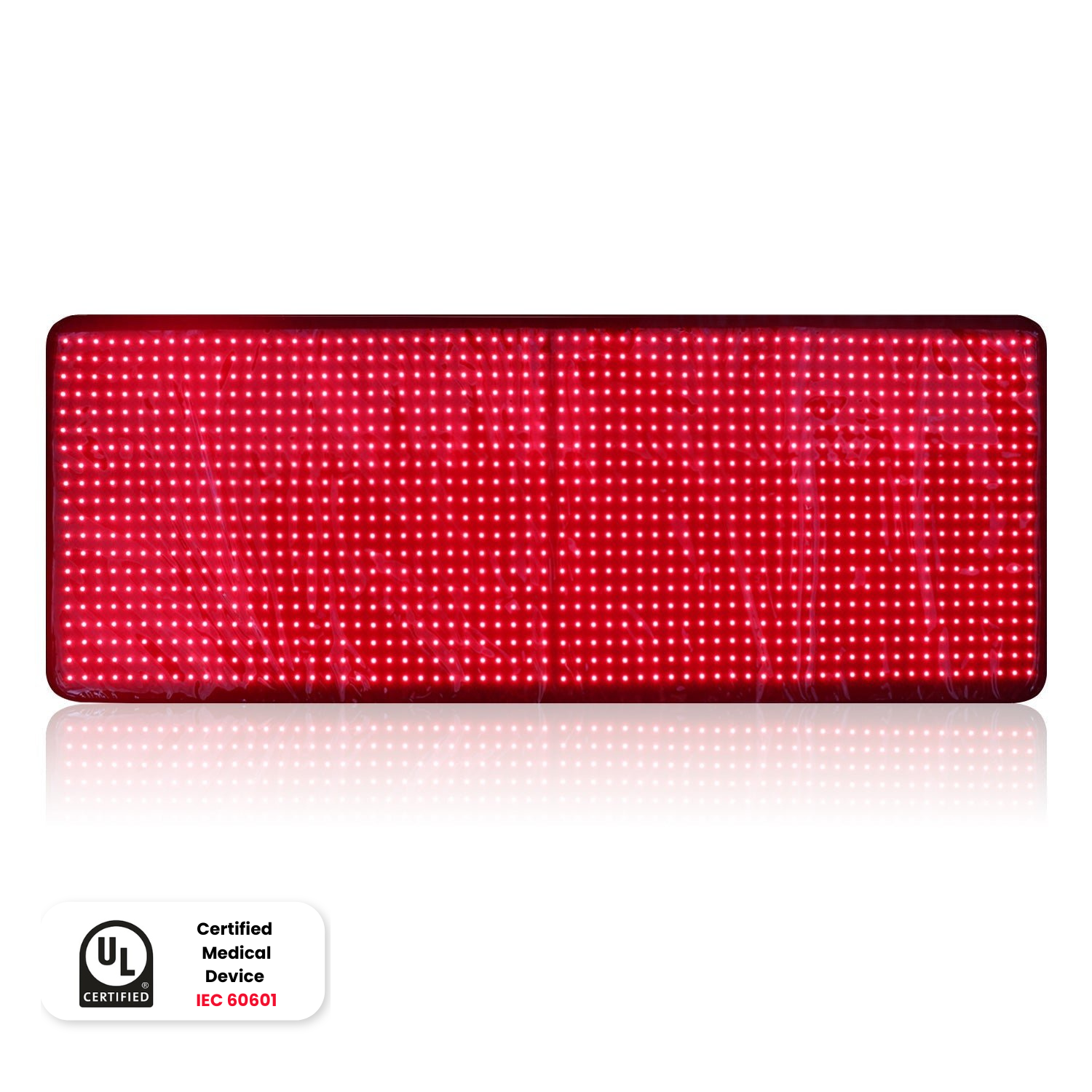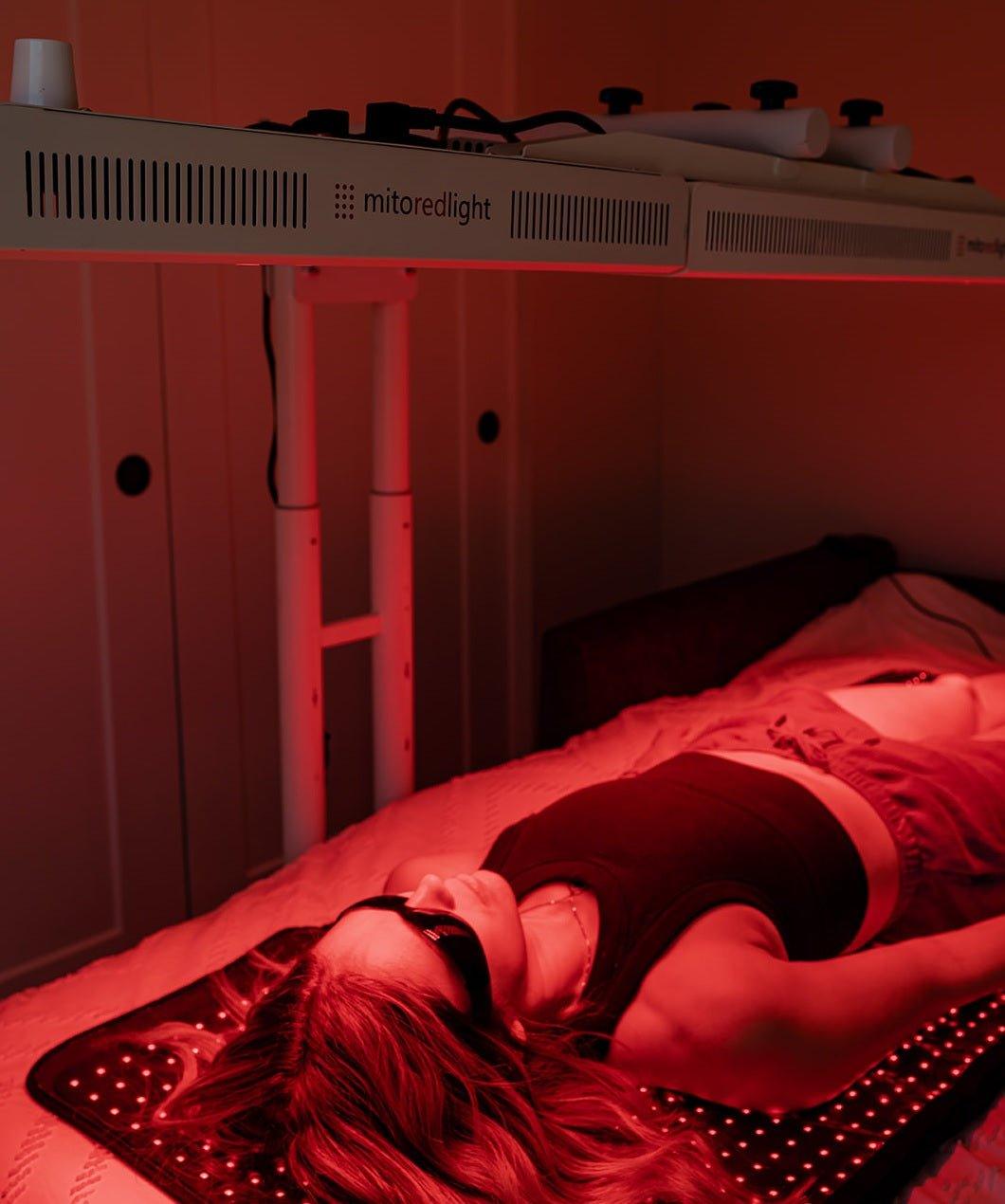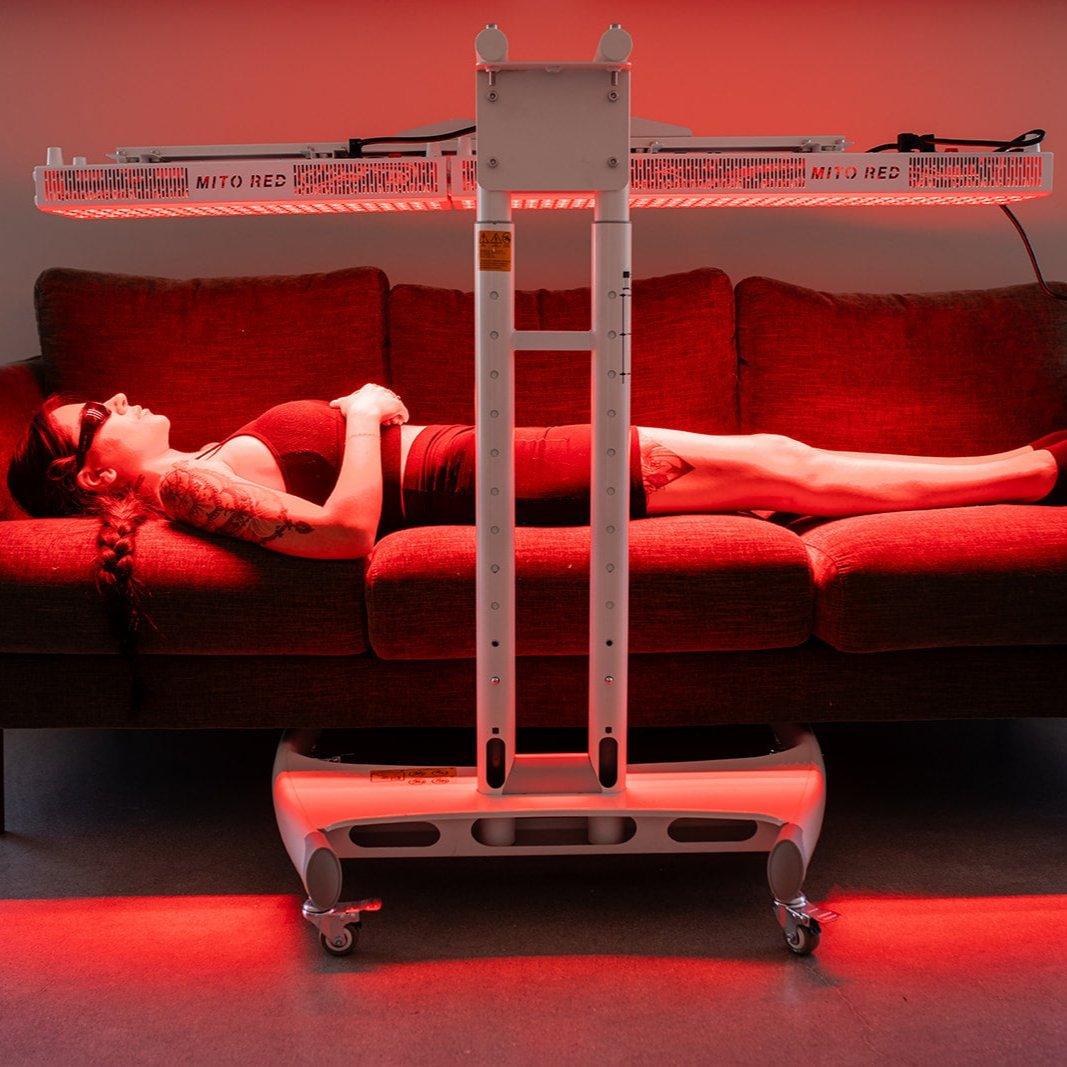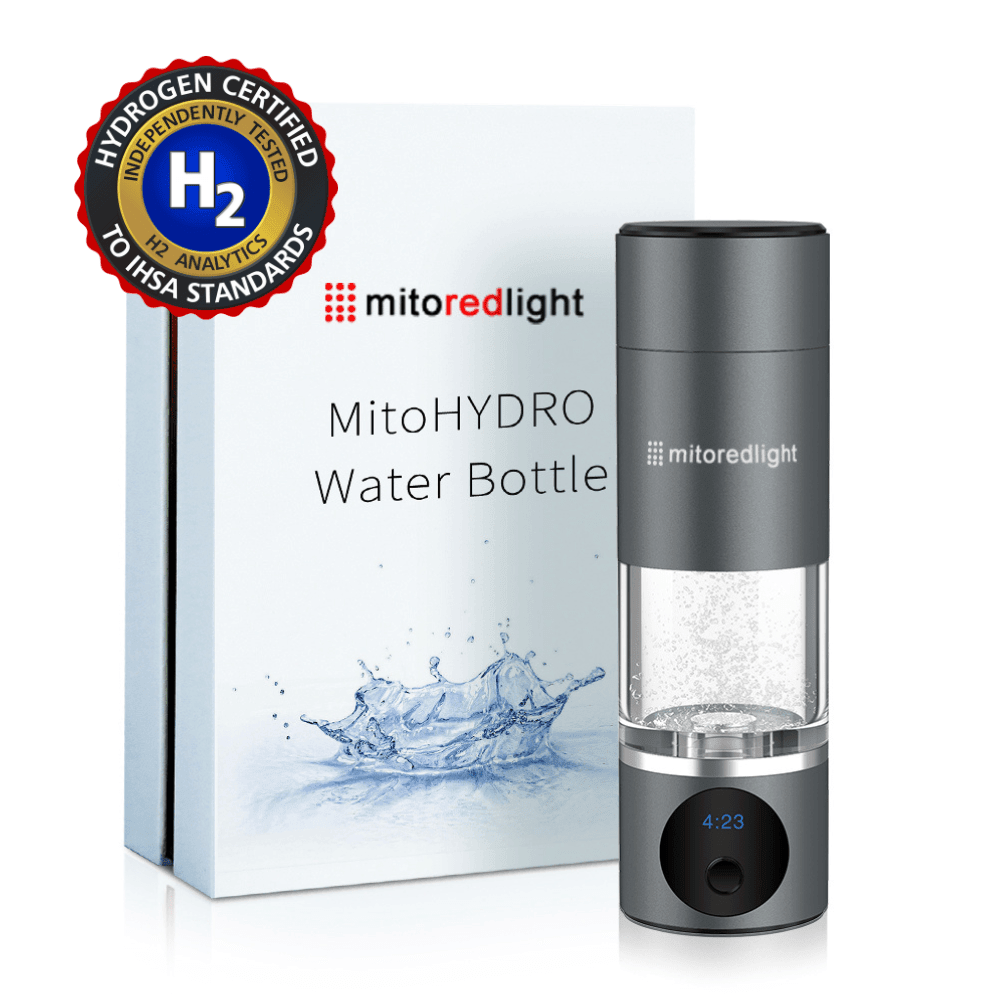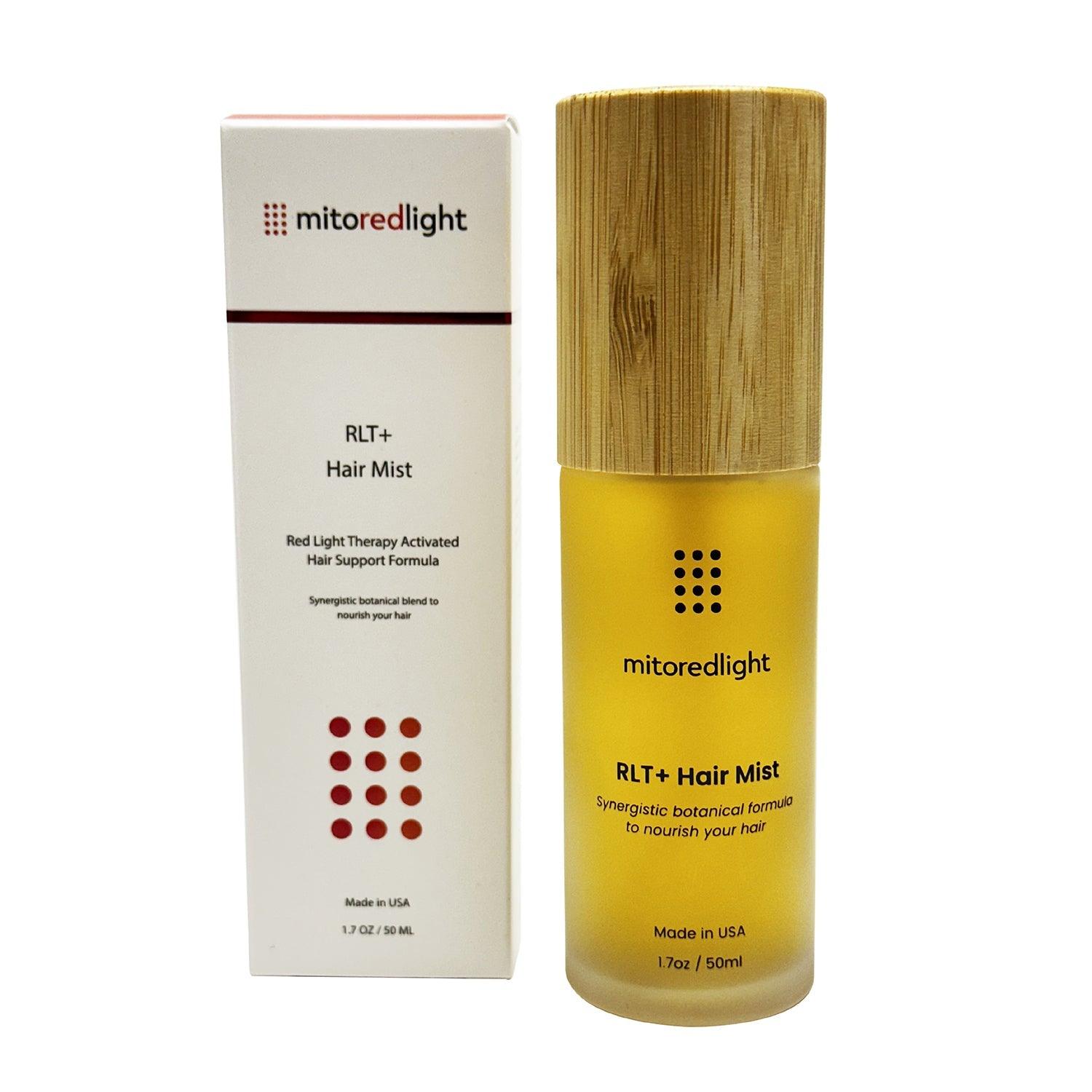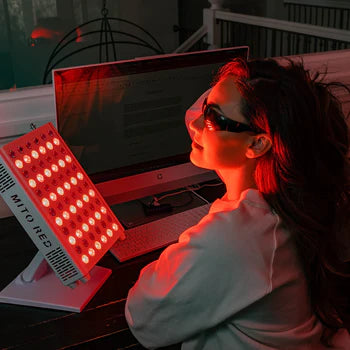DISCLAIMER: Mito Red Light devices are Class II wellness devices aimed at affecting the body through topical heating and supporting cellular function. The information provided in this article and on this site is for educational purposes only and is not intended to imply effectiveness of Mito Red Light devices for any specific application. The information provided in this article and on this site is not intended to diagnose, treat, cure, or prevent any disease, is not a substitute for consultation with a licensed medical provider and should not be construed as medical advice. Click here to read our article on potential contraindications of red light therapy..
Table of Contents
- 12 Tips for Skin Health
- Hydrate
- Use Sunscreen
- Avoid Smoking
- Collagen
- Good Facial Hygiene
- Gentle Exfoliation
- General Health
- Stay Active
- Use Vitamin C
- Limit Handling of Your Skin
- Follow a Good Diet
- Avoid Stress
- Trends in Advanced Skin Care
- Skin Biome Care
- Cryotherapy
- Red Light Therapy
- Mito Red Light
The well-being of your skin is an essential part of your overall health. Skin plays a vital role in protecting your body from infection, regulating your body temperature, allowing you to feel important sensations such as heat and pressure, and even helping maintain a correct level of hydration.
Not only is your skin important from a health perspective, but it also affects your social and psychological well-being. Your skin is the external part of you that people see and plays an important role in how people perceive your health, hygiene, and age. This influences both how other people see you and how you see yourself.
Taking care of your skin will help you to maintain optimal health while simultaneously improving the often subconscious impressions that people have of you based on your skin quality. Good skin care can also help you to feel better about yourself, improving your psychological wellness and leading to better self-care.
12 Tips for Skin Health
Most people know that taking care of their skin health is important, but they find it difficult to know how to best take care of their skin. Understanding what actions you can take to improve your skin health and quality will be an important first step in reaching the next level of skin health. We have provided some of the most beneficial skin health tips that dermatologists recommend to help you get started.
1. Hydrate
Your body is about 60%-75% water, making hydration an important aspect of skin health. Staying hydrated will keep your skin hydrated, making it fuller and keeping out wrinkles that occur with dry skin. Staying hydrated also keeps your skin from having to produce oils to compensate for dehydration, reducing the potential for clogged pores and acne.
2. Use Sunscreen

Exposure of the skin to sunlight can be damaging when excessive sun exposure occurs. The energy in sunlight, especially in its ultraviolet component, can damage the skin, leading to wrinkles, blemishes, uneven pigmentation, and even skin cancers. Regularly using sunscreen while outside can significantly reduce the damage that the sun causes to your skin.
3. Avoid Smoking

Smoking is among the worst things that you can do for your skin health. The toxins in cigarette smoke can lead to damage of collagen and elastin, two important molecules in the skin that keep it firm, elastic, and supple. This effect will lead to skin that wrinkles earlier and appears older sooner. Smoking also impairs wound healing, leads to changes in skin pigmentation, and increases the risk of several different skin diseases.
4. Collagen
Collagen is an essential part of your skin that keeps it elastic and supple while also affecting skin hydration. As we age, our body becomes less able to produce collagen and experiences more collagen breakdown. Many people who are concerned about the effects of aging on the skin take collagen supplements to help keep their skin as supple as possible and avoid the depletion of collagen that occurs with aging.
5. Good Facial Hygiene
Your skin produces oils throughout the day that can build up over time. These oils can trap dust and dead skin cells, leading to clogged pores and poorer skin quality. By regularly cleaning your face each day with soap and water, you can clean off these oils as well as dirt and skin cells that have accumulated throughout the day. Lukewarm water is recommended when cleaning your face to open the pores of your skin enough to clean them without opening them so much that it allows potential contaminates inside the pores.
6. Gentle Exfoliation

Your skin is a growing sheet of cells that is constantly replenishing itself. As new skin cells grow, working their way to the surface of your skin, the older skin cells die, eventually falling off. Exfoliation can help to remove these dead skin cells, cleaning your skin from these potential contaminants and improving your skin quality. Exfoliation involves using an abrasive tool or skin product that removes these dead skin cells but will need to be gentle to avoid removing live skin cells, which will lead to inflammation and irritation.
7. General Health
The health of your skin will be closely connected to your overall health. Liver disease or heart disease, for example, can often lead to things that affect the quality of your skin. Your overall health will also impact how well your body is able to rejuvenate skin cells and maintain a healthy level of collagen production. Your health also impacts your hydration, further affecting your skin.
8. Stay Active
Staying active has a variety of health benefits for every part of the body, including the skin. Exercise increases circulation to the skin, facilitating the removal of waste products while providing oxygen and nutrients that help the skin to stay healthy and young. While regular activity is good for your skin, be sure to stay hydrated and avoid sun damage that may occur with outdoor exercises.
9. Use Vitamin C
Vitamin C plays an important role in promoting the creation of collagen and keeping the skin healthy. While vitamin C can be ingested, it can also be applied to the skin topically, allowing it to specifically target the skin. Using vitamin C regularly is important for everyone, but especially for those who smoke or are at risk for sun damage, as both of these can negatively affect vitamin C levels.
10. Limit Handling of Your Skin
Your hands touch many different surfaces and items throughout any given day, picking up dirt and bacteria. Touching your face can transfer these contaminates to your face, causing the dirt and bacteria to build up and affect your skin quality. While this aspect of handling your skin applies mainly to your face, you should also avoid picking at your skin or popping pimples that occur, as this can lead to skin damage and scarring.
11. Follow a Good Diet

One particularly harmful factor when trying to maintain good skin health is inflammation. Inflammation can lead to skin damage, pimples, and poor skin quality. Eating foods that are high in sugar or refined foods can cause inflammation, making them best to avoid when trying to maintain good skin health.
12. Avoid Stress
While scientists do not fully understand why, stress has been shown to cause acne and affect skin quality. Taking care of your mental health by avoiding stress or by learning new coping mechanisms can help you to avoid breakouts and keep your skin in its best condition.
Trends in Advanced Skin Care
While the tips that we have covered for skin care are ideal for implementing for a basic skincare routine, there are several trends in skincare that are becoming popular ways of taking skin care to the next level and optimizing skin quality. These emerging trends are based on newer technologies and are growing in popularity with those who truly care about their skin.
Skin Biome Care
The skin biome refers to the trillions of microscopic bacteria and fungi that live on your skin. While the idea of bacteria living on your skin may not initially sound like a good thing, there has been wide field of research within the last decade showing that different strains of the right kind of bacteria will actually interact with skin cells and the immune system to promote healthy skin.
Cryotherapy
Cryotherapy is a new, emerging therapy option that involves cooling the skin, usually through exposure to cooled nitrogen gas. The extreme cold temperatures are only applied over a very short timeframe, affecting only the skin and not the internal organs. One potential benefit that cryotherapy may provide is boosting collagen production while simultaneously shrinking pores and wrinkles. Cryotherapy is a newer therapy but has shown initially promising results that make it one of the top new trends in advanced skin care.
Red Light Therapy
Red light therapy is a newer therapy that is growing in popularity due to its ability to be used to achieve a variety of health-related benefits. While red light therapy is used for everything from joint pain to sleep to wound healing, many people use it to improve their skin quality and health.
Red light therapy builds on the medical concept that certain wavelengths of light can bring about a physical effect on the body. This has already been well studied with ultraviolet light, which has been found to stimulate the synthesis of vitamin D, break down bilirubin, and stimulate melanin production in the skin. Red light is thought to stimulate mitochondria, the energy center of cells, to bring about its positive effects.
Red light therapy is thought to increase skin cell proliferation, regenerating the skin, according to a study published in the Journal of Aesthetic Nursing. There are also several studies that suggest red light therapy improves skin pigmentation abnormalities and the overall appearance of the skin. The emerging findings on the skin benefits of red light therapy have made it a promising advanced trend in skin care.
Mito Red Light
Mito Red Light provides a variety of red light therapy products that are specially designed to deliver specific wavelengths of light that are thought to help regenerate skin and improve overall skin health.
Customer feedback on skin has been outstanding. Check out some red light therapy before and after photos and our growing repository of glowing reviews.
We welcome you to review our selection of high-quality products or to contact one of our representatives at +1 866-861-6486 or by email at info@mitoredlight.com.
Related Articles:
- Red Light Therapy for Anti-Aging, Skin Rejuvenation, Collagen Production and Overall Skin Health
- Collagen: What is it and Why Does it Matter?
- What Is Red and Near Infrared (NIR) Light Therapy?
- Red Light Therapy Buyer’s Guide
- Everything You Need to Know About Red Light Therapy and SKIN
DISCLAIMER: Mito Red Light devices are Class II wellness devices aimed at affecting the body through topical heating and supporting cellular function. The information provided in this article and on this site is for educational purposes only and is not intended to imply effectiveness of Mito Red Light devices for any specific application. The information provided in this article and on this site is not intended to diagnose, treat, cure, or prevent any disease, is not a substitute for consultation with a licensed medical provider and should not be construed as medical advice. Click here to read our article on potential contraindications of red light therapy..







